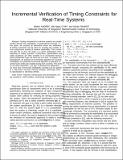Incremental Verification of Timing Constraints for Real-Time Systems
Author(s)
Andrei, Å tefan; Chin, Wei Ngan; Rinard, Martin C.
DownloadCS011.pdf (144.8Kb)
Metadata
Show full item recordAbstract
Testing constraints for real-time systems are usually verified through the satisfiability of propositional formulae. In this paper, we propose an alternative where the verification of timing constraints can be done by counting the number of truth assignments instead of boolean satisfiability. This number can also tell us how “far away” is a given specification from satisfying its safety assertion. Furthermore, specifications and safety assertions are often modified in an incremental fashion, where problematic bugs are fixed one at a time. To support this development, we propose an incremental algorithm for counting satisfiability. Our proposed incremental algorithm is optimal as no unnecessary nodes are created during each counting. This works for the class of path RTL. To illustrate this application, we show how incremental satisfiability counting can be applied to a well-known rail-road crossing example, particularly when its specification is still being refined.
Date issued
2005-01Series/Report no.
Computer Science (CS);
Keywords
Real-time infrastructure and development, timing constraint, #SAT problem, incremental computation
